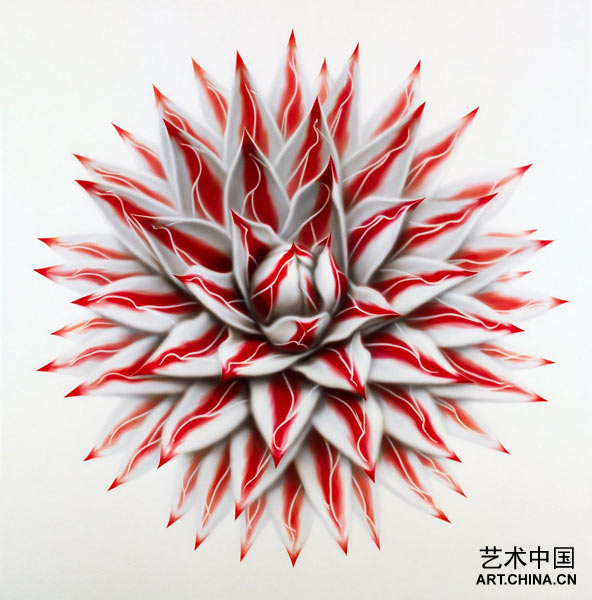 Flower of Desert - Permeating acrylic & oil on canvas 130.3x130.3cm 2008
Flower of Desert - Permeating acrylic & oil on canvas 130.3x130.3cm 2008
鄭志玹個展——沙漠中的春天
開幕式:2008年10月1日下午15:00(星期三)
展期:2008年10月1日—10月15日
展覽總監(jiān):王國文
展覽主持:麥豐
展覽助理:周葳
設(shè)計:周葳
展覽地點:上海市歐陽路580號朱屺瞻藝術(shù)館
開放時間:10:00—16:30(逢周一休館)
聯(lián)系電話:021—56710742
電子郵件:mary27art@yahoo.com.cn
Opening Reception: 15:00PM,Oct.1st Wednesday,2008
Exhibition Period: Oct.1st—Oct.15th,2008
Curator: MARY MAI
Administrative Director: Wang GuoWen
Exhibition Assistant: Zhou Wei
Designer: Zhou Wei
Venue:No.580 OuYang RD. Zhu QiZhan Art Museum
Opening Hours:10:00AM—16:30PM(Close On Monday)
TEL:021—56710742
E—Mail:mary27art@yahoo.com.cn
前言
鄭志玹的作品總是試圖表現(xiàn)一種“錯位的實在感”。所謂實在感是因為被描寫的對象是在一種有意識的擺設(shè)下所被觀者感知的原因。相反感到錯位是因其物于環(huán)境的設(shè)定上有種不和諧的因素因此感到陌生。背景處理上漆黑的夜空朦朧的的云彩,或一片空虛的沙漠等描述的方式襯托出位于畫面中央的主題形象。在她畫中突然出現(xiàn)的一系列對比手段,使人聯(lián)想到實在感又產(chǎn)生戲劇性的錯位感,這對于解釋作品的隱喻來說提供非常重要的邏輯線索。
能看得出他的作品與超現(xiàn)實主義表現(xiàn)方式有著類似的地方。超現(xiàn)實主義畫家們一般采用一些打破日常秩序來達(dá)到無意識的超現(xiàn)實狀態(tài)。但是仔細(xì)觀察鄭志玹在她的作品中反復(fù)地并置鐵板,卵,棉,樹木和魚,鏡面等。這樣的執(zhí)著程度讓人懷疑她并不是以盲目的選擇題材來達(dá)到它無意識的表現(xiàn),更是有意的要反復(fù)對象而達(dá)到打破日常秩序。魚和卵是最為經(jīng)常出現(xiàn)的題材。它有時成為獨立的主體來刻畫在畫面中央,從而我們可以推想出這些主體應(yīng)該是具有著更多象征性的隱喻,同時也不能排斥她所要表現(xiàn)的無意識的狀態(tài)。在她的畫中形象與背景的錯位的安排,雖然跟超現(xiàn)實主義畫家們的手法相比有些拘謹(jǐn),但她以實在與錯位的方式打破日常秩序追求達(dá)到無意識的狀態(tài)。
Facing the Self Behind the Surface
Jeong Ji-hyun’s art belongs to modernism because objects cautiously selected to reveal her esthetic sense are sifted through a refined and restraint visual language. With her delicate strokes, a lifeless sofa and an unnoticeable cactus are transformed into creatures with soft skin or hairs. Thick fleshy stems of the cactus are in stark contrast to prickles in color, texture and form, imbuing her painting with visual vitality. “Seeing—an activity that is ultimately derived from touching” As Sigmund Freud once put it, the flat objects transcend the limits of visual dimension into the tactile realm. Her favorite objects like a cactus with bloody prickles, voluptuous sofa, and flowers gathering red mold are an apparatus to manifest animistic vigor. When her sophisticated sense lends a visual density to these relativistic and incidental things, they come to life again as essential and absolute beings. Meanwhile, the agent of change hides itself behind realistically depicted objects.
Ordinary things are uplifted in a pure form and acquire their own clarity that is isolated from concrete circumstances. They are likened to sample ores in a visual laboratory. Nobody knows where they come from. That is to say, the audience cannot easily imagine why she picked up such materials as plants or furniture, or who they used to belong to. That is because her point of view is far from the conventional human-oriented viewpoint that reflects the mutual relations between humans and their belongings. Objects were elaborately illustrated but had no substantiality that can serve as a source of developing humane stories. They are decolorized and left nothing but rhythmically visual accents. While objects break away from their ordinary images through the pure journey of painting, they eventually find themselves caught in another net, say, the prison of language. The language entrapment corresponds to the “self-referential” modernistic world. In this sense, the reconstruction of the world in prison is a fitting description of the “self-referential autonomy” of art, which is both blessing and curse.
Lee Sun-young (art critic)
In her paintings, Jung Ji-hyun decolorizes cactuses, flowers and apples and exhibits inanimate image. Drawing a paradox, she reinterprets the beauty of living things in her inimitable visual language. Her restrained and sophisticated language of her artworks will take the audience into the beauty of painting that is illusive on the surface, sensual in color and materialistic in form.
Kim Joon-gi
(art critic and professor at Kyung Hee University)
|

